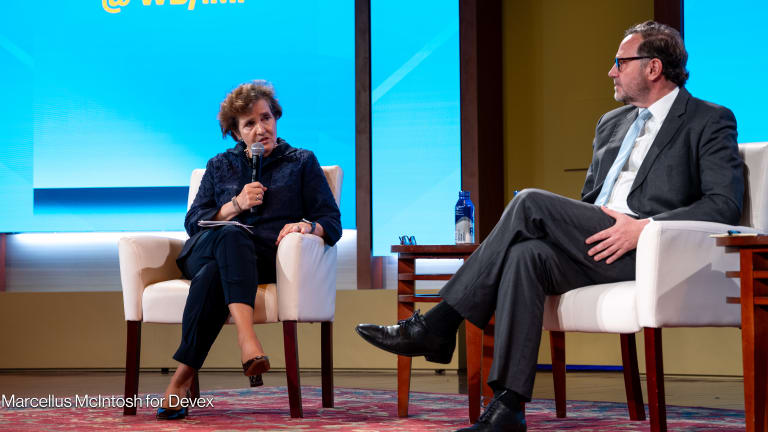
BONN, Germany — Although it’s not clear how many people will be uprooted by climate change, the number of “climate migrants” is predicted to increase.
Between 2008 and 2016 alone, more than 20 million people each year were newly displaced by extreme weather disasters, according to a recent Oxfam report. In the Pacific island nations of Vanuatu and Fiji, which is chairing COP23 — the United Nations climate conference in Bonn, Germany — more than 55,000 people were displaced because of cyclones in 2015 and 2016. And if sea levels continue to rise, hundreds of millions of people who live near the world’s oceans could be under threat.
But despite its negative perception, migration can also be a boon as a tool for adaptation, according to migration and legal expert Cosmin Corendea. A researcher at the United Nations University Institute for Environment and Human Security, Corendea’s expertise is at the intersection of climate change, human rights, and migration.
Having conducted research in the Pacific, Europe, and Asia, Corendea last week published a UNU report titled “Migration and human rights in the wake of climate change: A policy perspective over the Pacific,” which takes Fiji and Vanuatu — two of the countries most affected by climate change — as case studies to examine the implementation of international environmental law in the region.
He spoke to Devex about why using the right terminology around climate change-induced migration will be crucial for managing it, and why this concept hasn’t been higher on the agenda at COP23. The conversation has been edited for length and clarity.
“In order to have a successful implementation of any kind of international law, you need to define the concept well and independently, and you need a common definition.”
— Cosmin Corendea, migration and legal expert at UNUWhat are your key messages to policymakers here in Bonn?
I want them to look at climate change, migration, and human rights as one interconnected concept. You cannot talk about one of these three issues without referring to the other two. For instance, migration — or “human mobility,” which is a more inclusive concept of migration, displacement, and relocation — has direct implications for people’s human rights situation.
Secondly, the regional approach is probably the solution for the short- and medium-term future of regulating migration related to climate change. From a legal perspective, states are not ready to deal with migration and climate change and human rights. Negotiators also ought to acknowledge the growing body of research, and politicians should look at regional approaches as a more effective way of addressing people’s needs in regards to these three topics.
From your perspective, what’s lacking today in policymaking around climate migrants?
From the legal perspective, the climate migration process is affected by language and lack thereof. We don't have a binding and workable definition of what a climate or environmental migrant is. When I'm referring to “environmental migrant,” I mean a more inclusive concept of climate, because people are also affected by environmental degradation, of which climate change is a part.
We only have one working definition, which is a decade old: the 2007 definition from the International Organization for Migration, [which defines “environmental migrants” as “persons or groups of persons who, for compelling reasons of sudden or progressive changes in the environment that adversely affect their lives or living conditions, are obliged to leave their habitual homes, or choose to do so, either temporarily or permanently, and who move either within their country or abroad.”]
I do believe that the institutions have to step up and come up with some clarity in the language and terminology of what constitutes a climate or environmental migrant.
This COP so far has shown that the number of those who, as soon as the first climate change stressors appear, make a household decision to leave, has increased. Globally, their number is upwards of 30 percent. Instead of having migration as a successful source of adaptation and implementing adaptation measures, unfortunately the tendency in the world these days is quite the opposite. Moreover, states are passively witnessing migration patterns, which are non-regulated in most parts of the world. Without regional and national migration policies, states are not in a position to help those who migrate to, for instance, an urban area.
What are the real world implications of the lack of a binding definition of environmental migrants?
That depends on where you want to have this discussion. Do you want to have it within a climate change forum like COP23? Or within a migration forum like the Global Compact for Migration of the U.N.? Or within a human rights forum, where you have the human rights resolutions on climate change, which actually mention migration as being part of the process?
People are starting to become aware that climate change, migration, and human rights is one concept, not three separate ones. And they’re starting to act on that. It is, however, quite new. In order to have a successful implementation of any kind of international law, you need to define the concept well and independently, and you need a common definition.
The lack of language is also affecting states, mainly because they don't have legislation in place, which prevents them from starting to manage the climate migration situation better. Then there are researchers and politicians who are using different terminology like “climate refugees,” mainly for political reasons. It makes sense from their perspective, but legally, the concept of a “climate” or “environmental refugee” does not exist.
“Migration these days is perceived as something which happens on the spot. It's more like a humanitarian crisis than looking at it as a permanent process.”
—Why do you think this concept hasn't been higher on the agenda yet? Is it because migration generally has a negative perception?
I believe that migration is a positive phenomenon. The fact that it is not on the agenda these days is mainly because it's a sensitive issue. People, states, and negotiators don’t seem to be ready to acknowledge the fact that it's a subsidiary effect of climate change or human rights violation. So, migration these days is perceived as something which happens on the spot. It's more like a humanitarian crisis than looking at it as a permanent process. In some parts of the Pacific, for example, migration is considered a way of life. It has been there for 2,000 years. But today, it’s becoming more politicized, which makes it more difficult to address.
Do you think there’s a “sedentary bias” around migration? That is, that development theory and practice views migration as a negative phenomenon?
Not necessarily. Let's try to perceive migration as something positive. It's a historical process. We didn't invent it. It will be here to stay. You have this humanitarian crisis that is creating all kinds of biases and all kinds of situation scenarios where migration is perceived as something negative. However, we should not be surprised that this humanitarian crisis has appeared, mainly because we did not take any preemptive measures in the past. This surprise may continue in the future, unless we start regulating migration in a fashion that respects human rights, for example, through regional approaches. Otherwise, in 30 or 50 years, we will be surprised by the large number of migrants showing up again globally. Then, we'll have to face another crisis and even more biases.
Can you give a concrete example of how the regional approach works?
The resilience framework in the Pacific, for instance, acts regionally toward becoming more resilient. It might not be so predominant now, but the European Union is also an example of a regional approach. Then you have the African Charter on human rights, which is not necessarily a practical example, but it brings countries together guided by the same understanding of what human rights are. In Southeast Asia, there are different regional economic schemes that work much better than global trade schemes.
“The regional approach is probably the solution for the short- and medium-term future of regulating migration related to climate change.”
—The regional approach works because it increases the individual state's capacity to react to different issues that give more access to information. That’s very important. It gives you more understanding of what the process means, and the feeling and the reality that your own beliefs, traditions, and culture are respected and not vanishing somewhere in the process. In the final text of the Paris Agreement, for example, there is not a lot of indigenous language, although some of the countries with an interest in protecting indigenous peoples’ needs included it. But that language disappeared for political reasons. Human rights was operational in the Paris Agreement, but now it's only in the preamble, mainly because some of the countries were reluctant about specifying what “human rights” means.
Speaking of regional approaches, can you tell me about migration as an adaptation tool?
As an adaptive measure, migration can give people the capacity to stay in place, if migration is temporary. For example, when a member of the household leaves to an urban area, she or he can send remittances back by accessing a labor scheme. This will allow them to eventually come back and continue their life in their home country.
The regional approach as a migration tool for climate adaptation is looking at migration from the legal perspective. It needs to be regulated at the regional level, mainly because of the limited capacity of states to address migration individually and because of this global process, which is slow, political, and sometimes doesn’t address people's needs.
The regional approach allows you to conserve people’s traditions and values, and respect human rights. Countries in different parts of the world that acted regionally were more efficient than those who acted globally. From this perspective, migration could become regulated, which could prevent humanitarian crises in the future.
Read more Devex coverage from COP23








